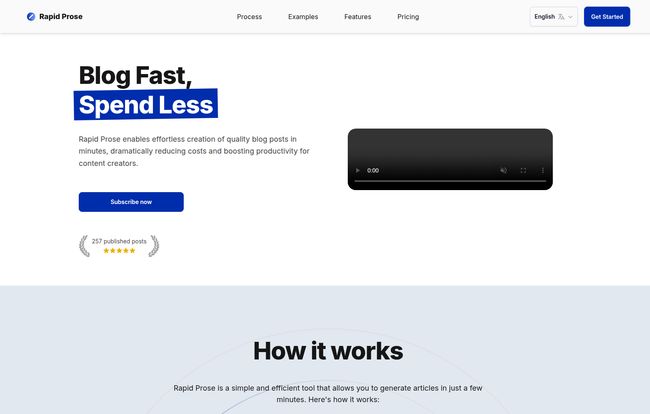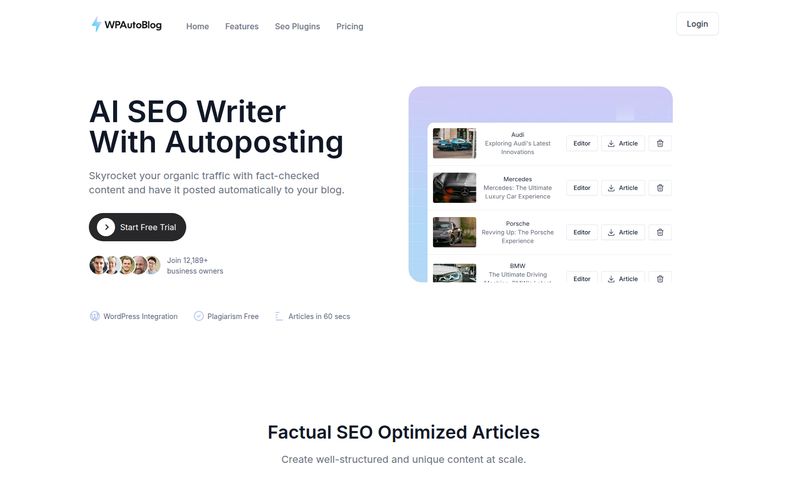We’ve all been there. It's 10 PM, the cursor is blinking mockingly on a blank page, and you have a content calendar screaming for its next blog post. The pressure to constantly churn out quality, SEO-friendly content is, let's be real, a grind. For years, I've lived by the keyboard, researching, outlining, writing, and wrestling with keywords. It’s a process I love, but man, it can be a time-sink.
So, when another AI article generator pops up on my radar, my first reaction is usually a healthy dose of skepticism mixed with a tiny spark of hope. The latest one to catch my eye is Rapid Prose, with its bold promise: "Blog Fast, Spend Less."
Alright, Rapid Prose. You have my attention. But as anyone who's been in the SEO game for more than five minutes knows, promises are cheap. Traffic and rankings are not. So I decided to take it for a spin and see if it’s just another piece of shiny new tech or a genuinely useful tool for us folks in the content trenches.
So, What Exactly is Rapid Prose?
At its heart, Rapid Prose is an AI-powered writing assistant designed to take a simple prompt—basically, just a title—and generate a full-blown blog post in minutes. The idea isn’t to replace you, the writer, the strategist, the human with the actual ideas. No, the goal is to obliterate writer’s block and hand you a fully-formed, structured first draft so you can skip the grunt work and get straight to the refinement and publishing stage. It's aimed at bloggers, marketers, and small businesses who need to scale their content production without, well, scaling their costs into the stratosphere.

Visit Rapid Prose
Putting It to the Test: My Walkthrough of the Process
The homepage claims it's a simple process, and I have to admit, it is pretty straightforward. There are no overly complicated dashboards or a million settings to tweak, which I appreciate.
Step 1: The Brain Dump
First, you give it an "Article title." This is your main command. But the secret sauce, in my opinion, is the "Context" box. Here, you can add notes about your target audience, the desired tone, or specific points you want to be included. I tested it with "How to prepare for a marathon," and in the context box, I added, "For amateur and semi-professional runners preparing for their first race. Focus on training schedules, nutrition, and mental prep." Giving it this extra direction is crucial. Garbage in, garbage out, as they say.
Step 2: Choosing Your Settings
Next, you get to select a few presets. You can choose the word count for your article, the writing language, and a few other bits and pieces. I love that you can generate multiple articles at once by just listing the titles. For an agency pumping out content, that's a serious time-saver right there.
Step 3: The (Very Short) Waiting Game
Rapid Prose claims you'll have an article in less than 5 minutes. And... they're not lying. It’s alarmingly fast. You get an email notification when it’s ready. It’s like ordering a pizza and having it show up before you’ve even put the phone down. This speed is probably its biggest, most impressive feature.
The Good, The Bad, and The AI-Generated
No tool is perfect, right? Rapid Prose has some fantastic high points, but also a few quirks that made me raise an eyebrow. It’s not a simple good-or-bad situation; it’s about what you’re willing to trade for convenience.
The Good Stuff (The Big Wins)
The speed is the obvious one, but let's go a little deeper. The output is genuinely SEO-friendly. It comes with a proper structure—H1s, H2s, H3s—that gives you a solid foundation to work from. It's not going to nail your local SEO or intricate keyword strategy out of the box, but it saves you the hassle of structuring a draft from scratch. Think of it as a content microwave. It’s not a gourmet, slow-cooked meal, but it gets you a hot, usable plate of food in 90 seconds when you're starving. The multi-user and team collaboration features are also a nice touch for growing teams that need to work from the same dashboard.
The Not-So-Good Stuff (The Gotchas)
Okay, let’s talk about the credits system. Honestly, this is my biggest gripe. The monthly subscription gives you a certain number of words, but unused credits do not carry over to the next month. This “use it or lose it” model creates a sense of pressure to generate content just for the sake of it.
Even more importantly, the platform has a strict no-refund policy, and generating an article consumes credits even if the result isn’t what you wanted. That feels like a bit of a gamble. You’re paying for the roll of the dice, not a winning hand. If you’re a solo creator on a shoestring budget, burning credits on a dud article could be pretty frustrating.
Let's Talk Money: A Breakdown of Rapid Prose Pricing
The pricing structure is pretty clear, which I can respect. It's a tiered monthly subscription based on word count. There's no shady, hidden fees, at least from what I could see.
| Plan Name | Price | Word Count | Best For |
|---|---|---|---|
| Basic | $19 / month | 20,000 words (~40 articles) | Solo bloggers or small sites getting started. |
| Popular | $59 / month | 100,000 words (~200 articles) | The sweet spot for active content creators and small agencies. |
| SEO Strategy | $99 / month | 250,000 words (~500 articles) | High-volume agencies and large content teams. |
For my money, the Popular plan at $59 seems like the most balanced value proposition. It offers enough words to keep a busy blog or a few client sites fed with content without breaking the bank. The cost-per-word is incredibly low across all tiers, which is the main selling point. But you have to remember that credit policy when making your decision.
A Writer's Best Friend or a Job Killer?
This is the big, looming question with every new AI tool, isn't it? I’ve seen some hot takes online, with folks either heralding AI as the savior of productivity or the doom of creative professions. I land somewhere firmly in the middle.
"AI won't replace you. But a person using AI will."
I saw that quote floating around on LinkedIn a while back, and it's stuck with me. Rapid Prose is a tool. A powerful one, yes, but still just a tool. It's a first-draft machine. It can't go interview an expert, it can't share a vulnerable personal story, and it can't capture teh unique voice and perspective that makes your blog yours. The real value comes from taking its 80% solution and layering your 20% of human expertise, storytelling, and fact-checking on top.
My Final Verdict: Should You Subscribe?
After playing around with Rapid Prose, here’s my final take. It's a genuinely impressive tool for a specific type of user.
You should definitely consider it if:
- You're part of a content agency or team that needs to produce articles at a high volume.
- You're a solo blogger who constantly struggles with writer's block and just needs a starting point.
- Your content strategy involves covering a wide range of topics where you need well-researched, structured drafts quickly.
You might want to hold off if:
- You're on an extremely tight budget and can't afford to "waste" credits on an article that doesn't pan out.
- Your writing is deeply personal, narrative-driven, or requires a level of nuance and expertise that current AI just can't replicate.
- You genuinely enjoy the research and outlining process and don't want to skip it.
Ultimately, Rapid Prose is a powerful accelerator. It takes the most time-consuming part of content creation and condenses it from hours into minutes. But it's not an autopilot button. The final product's quality still rests squarely on your shoulders.
FAQs About Rapid Prose
How does Rapid Prose actually generate the articles?
It's pretty simple on your end. You provide a title and some optional context (like audience or tone). The AI then uses that prompt to generate a fully structured article, which is usually ready in under five minutes.
What happens if I don't like the article it generates?
This is a big one. According to their policy, you still use up your credits for that generation, and there are no refunds for unsuitable articles. It’s best to be as specific as possible in your initial prompt to get the best results.
How long are my word credits valid for?
Your credits are tied to your monthly subscription. They expire at the end of each billing cycle and do not roll over to the next month. So, you have to use 'em or lose 'em.
Can I use Rapid Prose with my team?
Yes! All the pricing plans mention multi-user management, so you can collaborate with your team members under a single subscription, which is a great feature for agencies and businesses.
How much does it really cost?
It starts at $19 per month for the Basic plan (20,000 words) and goes up to $99 per month for the SEO Strategy plan (250,000 words). The best plan for you depends entirely on your content output needs.
Reference and Sources
- Rapid Prose Official Website
- Rapid Prose Pricing Page
- Content Marketing Institute - AI Tools for Content Marketers



